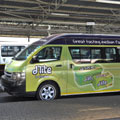Two years ago, I was exposed to a course that completely blew my mind but also spoke to my heart. It was entitled "Innovating Business at the Base" and was coupled with the book New Markets, New Mindsets.

Image credit: 95C from Pixabay.
It was quite eye-opening content and exciting for me – both as a marketer and a consumer in a third-world country where socioeconomic factors are dominant when it comes to addressable marketing.
The most exciting consumer segment is the base-of-the-pyramid consumer, mainly because that’s where the majority of South Africa’s population lies. This segment proves to be a challenge for most brands because they have to be highly relevant, speak to a specific need and find innovative ways to grab the attention of this consumer.
Brands accomplish this with the right product tapped into the correct mindset, needs and trust relationships of low-income earners.
Going to the base
The growth of brands lies in this untapped market – which has a lot of potential. Credit Suisse wrote that global inequality is one of the biggest threats to worldwide growth.
Can brands afford to cater only to the needs of the wealthy and middle-class when the bulk of the population in developing economies resides in the lower-income space? Of course not.
The revenue from the base of the pyramid market is far less a victim of fluctuating economic cycles and can actually be a stable revenue base during economic downturns, which is essentially what we need in the current economic climate that South Africa and Africa as a whole is experiencing.
Innovating business at the base allows organisations to offer new technologies, operating methods and management approaches – which increase productivity, gain efficiency and expand markets by serving new needs. We need more brands that take the time to know what the base of the pyramid consumer needs – what their expectations and aspirations are.
The base-of-the-pyramid consumer
Brands need to know what this segment’s reason for being is and tailor their products accordingly. Base-of-the-pyramid consumers are predominantly located in townships and rural areas – which are infrastructurally marginalised – and coupled with limited disposable income, gives rise to the need for reverse innovation, consumer-centric design and frugal engineering which are critical in this space.
Collaboration, partnerships and social and business networks are key for social embeddedness – which is vital in these markets.
MNCs (multinational corporations), social entrepreneurs and governments have undertaken a shift in thinking in order to cater for this consumer. We applaud brands that have paid attention to this segment and created products that speak to their needs like Nestlé, Nedbank, McCain, Unilever and Danone, to name a few, have done.
Danone’s yoghurt is filling and does not require refrigeration, providing the brand with an opportunity to penetrate this consumer segment with a nutritious dairy product that’s affordable and is cognisant of the realities that this segment faces such as no refrigeration, electricity and the need for a filling food product.
From a media perspective, we have several solutions that help us communicate with the BOP consumer while minimising wastage. African language stations (ALS) and community radio stations such as JoziFM help us reach this consumer effectively.
TV also plays a vital role through the use of free-to-air channels such as SABC1 and 2, Openview HD, eTV, community TV like Soweto TV and DSTV access – which is the more affordable package on the direct-broadcast satellite service packages.
Out-of-home media offers commuter media, taxi branding, taxi TV, rank TV and rank radio – which makes this consumer segment very accessible. Digital media makes things more exciting considering we are a mobile-first continent.
Hugh Wilson,
Provantage 19 Apr 2017 The provision of placements such as Facebook Lite, sponsored calls, sponsored SMS, Please Call Mes in text and video, sponsored WI-FI, Opera Mini and zero-rated services such as Freebasics by Facebook to name a few certainly help the cause.
So just when you thought we were faced with an impossible challenge to reach bottom-of-the-pyramid consumers, you find that we actually have the capability and the means – we just need to be strategic about tapping into this market that can make a massive difference to a brand’s bottom line.



















































